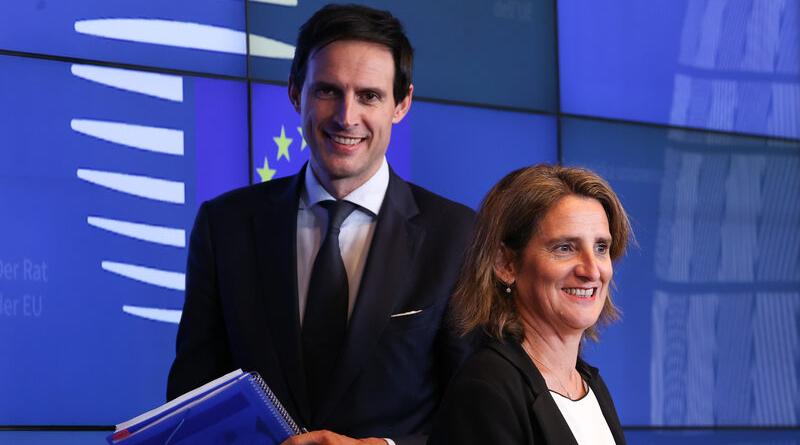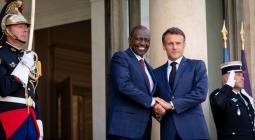EU countries hammer out joint stance for Cop28 climate summit

EU countries on Monday (16 October) adopted a common stance for the United Nations Cop28 international climate conference but language on the EU’s emissions reduction target and fossil fuel exit goal was softened to reach a unanimous decision.
The EU’s 27 environment ministers met in Luxembourg on Monday to agree on the EU’s stance for the Cop28 summit opening in Dubai on 30 November, throwing their weight behind a goal to triple global renewable energy capacity and double energy efficiency improvements by 2030.
The European Union will also push for a “predominantly fossil-free” global energy sector “well before 2050” and strive to reach a “fully or predominantly decarbonised power system in the 2030s,” according to wording agreed by the bloc’s environment ministers.
However, the most ambitious countries had to accept watered-down language on the EU’s push to phase out fossil fuels and reduce emissions as the decision needed to be taken by unanimity.
“Would [the Commission and Presidency] have been able to go even further? Absolutely. And yet, you know, this is a Union where, in the end, we create a mandate with 27 countries,” said EU climate chief Wopke Hoekstra after the meeting.
The European Commission and EU presidency holder Spain pushed for stronger language on emissions reduction, saying the EU’s updated legislation would raise the bloc’s climate target from a 55% net reduction in greenhouse gas emissions by 2030 to a 57% reduction.
But they had to bow to pressure from Eastern EU countries, which have a more significant challenge decarbonising their economies because of their heavier reliance on coal.
“Texts adopted by unanimity always take a little longer to agree. European countries have quite different energy situations, with some still very dependent on coal,” explained a source in the cabinet of French energy transition minister Agnès Pannier-Runacher.
Updated pledge, but no new target
EU member states will go to Cop28 stressing the importance of scaling up the global ambition to remain within the 1.5ºC global warming limit, said a statement released after the meeting.
While the EU will not come with a new emissions reduction target, it will update its pledge to reflect the EU’s ‘Fit for 55’ package of legislation adopted to meet its 2030 climate goals.
According to the European Commission, fully implementing the package will result in a 57% reduction in net emissions by 2030 compared to 1990 levels, more than the initial 55% goal agreed two years ago.
The higher objective reflects the EU’s ambition to grow its carbon sinks and increased level of ambition on renewables and energy efficiency, pushed forward last year in reaction to Russia’s war in Ukraine.
But according to Ribera, some countries had concerns about putting this figure to paper. “The main argument was that they did not want to create any confusion. It was not a new goal,” she explained.
In the end, a compromise formulation stipulates that “the Fit for 55 package, when fully implemented, could enable the EU to exceed its target of at least -55%,” said the French ministerial source.
Environmental activists, for their part, want the EU to support a Cop28 outcome that is grounded in science, and to recognise that more must be done to align climate action and finance with Europe’s historical responsibilities.
“For the EU’s climate targets, this means the EU needs to commit to substantially overshoot its current target of -55% net emission cuts and achieve at least -65% gross, or -76% net emission cuts by 2030 and net zero emissions no later than by 2040,” said Sven Harmeling, international climate policy coordinator at the NGO group Climate Action Network Europe.
“Unabated” fossil fuels
The EU’s Cop28 position also includes calls to peak emissions this decade and phase out “unabated” fossil fuels, a controversial term referring to carbon capture and storage technologies.
“We still have this idea that we have to try and avoid using fossil fuels if they have no abatement system and that the long term objective is that they should be phased out of our energy mix as we try to promote decarbonisation,” Ribera explained.
“The agreement in the Council conclusions is that these [abatement technologies] are technologies which should be tied to those sectors where it’s going to be difficult for them to engage in decarbonisation, where it’s difficult to wean themselves off fossil fuels,” she added.
Here too, a compromise solution was found in order to reach a unanimous decision among the 27 member states.
“The term ‘unabated’ appeared twice. There was a compromise: we kept it once in the second line of paragraph 14 and deleted it the second time,” the French source said.
Another complex issue related to subsidies for fossil fuels, which is sensitive for Eastern EU member states like Poland where coal makes up 70% of the electricity mix.
“There, we found a sentence that says: ‘calls for a phase out of fossil fuel subsidies’,” the French source explained. “We removed the word ‘inefficient’ because we believe that all fossil fuel subsidies are inefficient,” he added.
Similarly, the EU text does specify an exact date for when coal power should be phased out. “But we did say that there is an objective of achieving a completely or predominantly decarbonised energy system during the 2030s, ‘leaving no room for new coal power’,” the French source said.
“This is a compromise formulation – there is no EU date for a total phase-out of coal. But given that many countries use a lot of coal, it’s still a significant result.”
According to Ribera, fossil fuel subsidies that do not address energy poverty or the just transition should also be phased out “as soon as possible”.
Greens slam EU climate commissioner ‘crash landing’
Environmental campaigners and the Greens in the European Parliament were quick to criticise the Council’s Cop28 conclusions, with German Green lawmaker Michael Bloss calling it a “crash landing” for climate commissioner Wopke Hoekstra who is entering his second week in office.
“The new climate commissioner has promised a lot and not delivered,” Bloss said, referring to the final outcome on EU’s target and the references to unabated fossil fuels.
“The fossil industry will use this loophole to continue burning coal, oil and gas without regard to climate protection. But climate protection is only possible without fossil energies!” he said, adding Hoekstra will need to be more assertive in Dubai.
“The NGO group Climate Action Network Europe also called for the EU to strengthen its stance.
The EU has collectively missed the mark by calling only for a global phaseout of ‘unabated’ fossil fuels,” said the group’s director Chiara Martinelli.
“Instead of throwing a lifeline to the fossil fuel industry and placing a risky bet on an unproven, highly expensive method of capturing their carbon emissions, it is far more cost-effective to rapidly phase out fossil fuels and intensify efforts to build a fully renewable energy system,” she added.
This article was produced by Euractiv and republished under a content sharing agreement. Read the original here.





